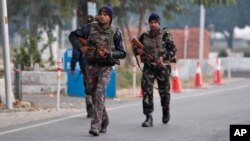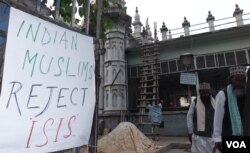Days after a landmark visit to Pakistan and Afghanistan by the Indian prime minister, regional terror against Indian installations erupted, stalling diplomatic progress and derailing optimism that Pakistan, Afghanistan and India can overcome long-standing differences.
On his way back from Kabul, Indian Prime Minister Narendra Modi stopped in Pakistan to meet his counterpart Nawaz Sharif on Christmas Day.
Just after the New Year, heavily-armed gunmen launched an attack on a strategic Indian airbase in Pathankot town near the Pakistani border, leaving six attackers and seven security personnel dead.
Hours later in neighboring Afghanistan, assailants stormed India's diplomatic mission in the northern city of Mazar-e-Sharif.
Several terror groups separately took responsibility, including one Pakistani organization tied to violence in Kashmir.
Undermining peace
Some analysts believe that the attacks were carried out to derail recent peace-building efforts between India and Pakistan, which could also affect the security situation in neighboring Afghanistan.
It "follows a similar pattern," Nitin Gokhale, an Indian national security analyst, told the Los Angeles Times. "Every peace move — even if symbolic — is followed by an audacious attack.”
Afghan analyst Javed Ghafoor told VOA Pashto: "It seems that India and Pakistan want to improve their ties, but there are some groups that want to sabotage these efforts.
“There are mafia circles, as well as global terror groups such as al-Qaida and the new Islamic State group which may also be involved so that the ties [between the two countries] do not improve,” he said.
Pakistan-based political analyst Khadim Hussain said, "The basic goal of the attacks was to create trust deficit between Pakistan and India."
Talal Chaudhary, a member of Pakistan's parliament, told VOA's Urdu service: "There are forces in both countries that do not want ties between the two countries to improve."
He added that "non-state actors" want to sabotage recent efforts to restart negotiations.
The recent incidents will likely put peace negotiations scheduled for next week between Pakistan and India in jeopardy.
The Indian government said Thursday that Pakistan must deliver "prompt and decisive action," indicating that the talks between the two countries are unlikely to go ahead.
"The ball is in Pakistan's court," said Vikas Swarup, spokesperson for the India's Foreign Ministry.
"India now awaits a prompt and decisive action. … Eight days remain for the foreign secretary-level talks between the countries, let's see what happens in these days before January 15," Swarup told reporters.
Indian opposition parties also have expressed concerns about the scheduled talks.
IS expansion
Analysts say the terror groups in South Asia are interconnected and, at times, cooperate to carry out their plans and secure their continued existence in the region.
Kabul-based security analyst Javed Kohistani told Radio Liberty that "there are organizations that, by carrying out such actions, try to keep countries away so that they find safe havens for themselves and force countries into using them."
A spokesperson for the Afghan ministry of interior told VOA's Pashto service that "special circles" in the region use and train terror groups to target interests and facilities of other countries.
"It's damaging. Today's situation is worse than 9/11, what happened in Paris, and what is happening elsewhere, in Afghanistan and in the Middle East," former Pakistani ambassador to the U.S. Sherry Rahman said. "Pakistan cannot afford regionally or internationally that its name keeps on popping up in terrorism."
The escalation of tensions between the two nuclear powers will likely have a negative impact on the security situation in Afghanistan as the Afghan government is battling Taliban resurgence and a growing IS presence.
"It is an immense danger," Kohistani told Radio Liberty. "It is a huge threat to the region, to Afghanistan, to India, and to the countries of the region."
IS has also shown signs of expanding in Pakistan. Punjab province's law minister said this week that around 100 Pakistanis have joined the Islamic State in Syria and Iran. The group has been actively recruiting men and women in various cities of Pakistan.
In India, Union Minister Rajnath Singh said recently that India has no threat from IS and he added that "Indian values" will prevent young Muslims from joining IS. Still, the country's National Intelligence Agency chief has warned that IS could be a major threat.
And this week, after leading Indian politician Asaduddin Owaisi slammed IS ideology, an alleged IS sympathizer tweeted, "It's better for you to shut your mouth on Islamic State. If you don't know the truth, Islamic State will invade India soon."


